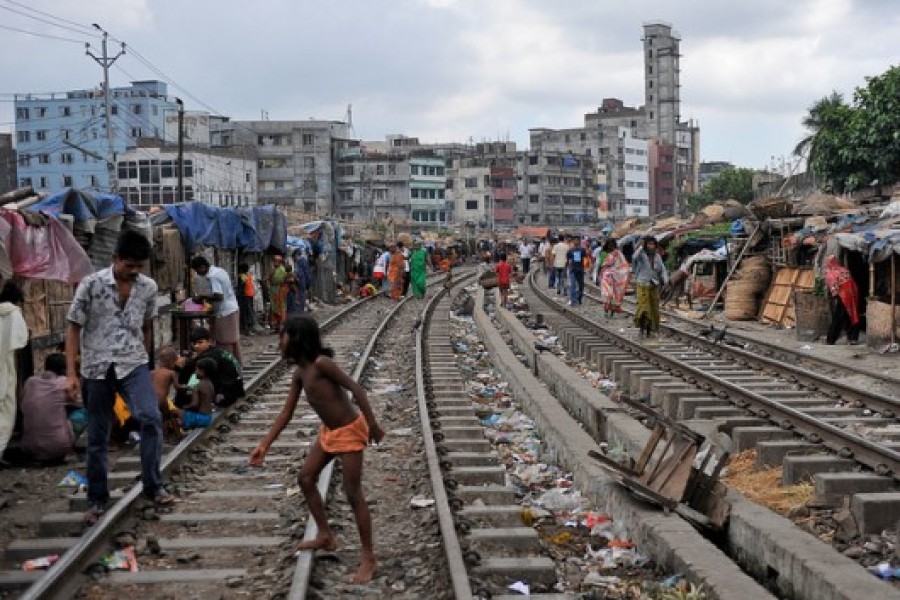The international community has recognised Bangladesh's unique success in reducing poverty. Even World Bank President Jim Yong Kim had words of praise for the country for its headway in poverty reduction while he visited Dhaka last year. He said Bangladesh has shown the world that a long list of hardships can be overcome. Kim was taking part in a discussion at Osmani Memorial Auditorium in Dhaka. "In fact, Bangladesh's people have shown that innovation, commitment, setting goals and visionary leadership can accomplish feats that few dared to imagine. I believe that Bangladesh can continue to build on this record and can end extreme poverty by 2030."
Kim recognised the fact that Bangladesh has already invested much in people -- way ahead of every other country else. "You have taught us how to keep children from dying of diarrhoea, how to treat tuberculosis and how to improve women's healthcare." Kim cited his own experience during his trip to Ghana in 2015 on the occasion of World Poverty Day where he met a garment factory owner. The factory owner was so proud that she had increased her productivity by 72 per cent and this was thanks to Bangladeshi advisers.
Poverty reduction in Bangladesh has been attributed to the fact that the economy has been growing at over 6.0 per cent on an average in the past one decade. Such growth lifted millions out of poverty. The World Bank statistics say 20.5 million Bangladeshis escaped from poverty between 1991 and 2010. In percentage terms, the poverty rate dropped to 18.5 per cent in 2010 from 44.2 per cent in 1991. Kim felt that Bangladesh has much work to do though: it has 28 million extremely poor, as per the latest estimates from household surveys.
Empowering women has been a crucial factor in poverty reduction in Bangladesh. The country recognised decades ago that empowering women is essential to ending extreme poverty. The World Bank President said: "Your leaders arrived at the logical conclusion that countries can never reach their full economic potential if half of the population is not fully participating". Another lesson, he said, the World Bank draws from Bangladesh sounds obvious, but far too few countries actually do it -- multiple partners are needed to accelerate progress in ending extreme poverty.
Aroma Dutta, a veteran leader in poverty reduction in the private sector, however, feels, local government is a key player in reducing poverty at the grassroots level. That is why she suggested revamping of the local governance structure and closely involving women, particularly ultra poor women, in it. Women can't bring the change alone, in fact, no one can do it alone, be it the government or NGOs. Bangladesh needs to follow the network approach where women will be part of all the networks and all the stakeholders will contribute according to their capacities, she opined.
It indeed augurs well that the government is working with NGOs and donor agencies to fight extreme poverty, the rate of which can be brought down to almost zero by 2025 after achieving the middle-income country status by 2021, according to an official projection. Although it is being highlighted that 10 million people will remain under the extreme poverty level even if the country attains 8.0 per cent GDP growth, the overall situation is gradually improving. Economists say planning from the grassroots level, increasing budgetary allocation for social safety net and annual development programme (ADP), and the government's efforts can bring marginalised people to the mainstream and will help the country eradicate extreme poverty. It is against this backdrop that planning should come from grassroots level. More and more plans should be initiated for socially excluded people.
Moreover, transformative potential of inclusive governance needs to be highlighted. It is critical to build capabilities and confidence of extreme poor leaders and establish relationships with local government representatives to strengthen citizens' demand for accountable and effective local governance. Sustainable changes occur when an extreme poor person or household reaches a level of economic well-being sufficient to meet basic needs, and achieves the levels of social and political inclusion necessary to ensure resilience to external shocks and to sustain their improved level of well-being over a longer term. Achieving the goal of reducing extreme poverty to less than 3.0 per cent of Bangladeshis by 2030 will require economic growth becoming more inclusive with the poorest 40 per cent of society receiving greater benefits from development.
The government should put more emphasis on developing small and medium enterprises (SMEs) as these provide opportunities for women to transform their lives for the better. It is often said that to sustain growth, an economy needs less government. It's also true that only the government can ensure that everyone has the opportunity to learn from new ideas. Over the last four decades, non-governmental and civil society organisations and voluntary groups have complemented what the government has been doing in areas such as health, education and women's empowerment.
But SMEs can only be established in areas that have good road networks and uninterrupted electricity and gas supply. And better roads can only help the extreme poor to take advantage of jobs and the SMEs of the markets. The thrust has to be given on this account.


